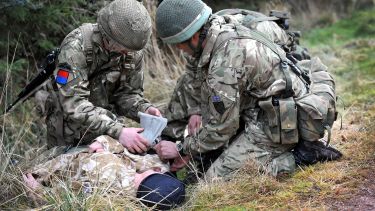- University of Sheffield researchers are developing a robotic system that could provide medical treatment to military personnel during combat
- System will enable trained medics to see the patient using a virtual reality headset and control a robot remotely to perform a medical triage
- Robotic system will be able to send photos and videos of injuries to medics and have the ability to take observations, such as a patient’s temperature, blood pressure, mouth swab and blood sample
Robots will soon be able to provide medical care to military personnel during combat, as part of new research at the University of Sheffield.
Researchers from the University’s Department of Automatic Control and Systems Engineering and Advanced Manufacturing Research Centre (AMRC) are designing a remotely-operated robotic system which will be able to perform a medical triage on a patient in the battlefield.
The system will then send photos and videos of the identified injuries to trained medics remotely and will also have the ability to take observations such as; a patient's temperature, blood pressure, mouth swab and obtain a blood sample from the arm.
The planned system will enable trained medics to see the patient using a virtual reality (VR) headset and control the robot using the latest technology already used in robotic surgery.
Currently, casualties in combat are attended to by a medical technician, similar to a paramedic. In the battlefield, the equipment and facilities available are limited before patients can be moved safely to a more advanced medical facility - which can take hours or even days.
This type of remote observation will be even more vital in helping to potentially save a patient’s life when threatening situations are a significant factor, including contagious diseases or a threat of contamination.
The project is being led by Professor Sanja Dogramadzi from the University of Sheffield’s Department of Automatic Control and Systems Engineering and David King, Head of Digital Design at the University of Sheffield AMRC.
Professor Dogramadzi, said: “Developing a remotely-operated robotic system would significantly improve safety by reducing the amount of danger military personnel are exposed to on the frontline. Our platform uses the latest technology and would integrate it in a way that hasn’t been done before.
“We are excited to lead on this research and share how the technology could be used in active service.”
The AMRC are leading the Medical Telexistence Platform (MediTel) development - which is the planned design of an unmanned ground vehicle with operator station, aimed for use in remote medical triage - and the integration of Robotics, Haptics and Immersive technologies.
Discussing the AMRC’s involvement, David King, said: “The MediTel project aims to help defence and security medical personnel remotely triage and treat casualties. MediTel will reduce the risk to medical personnel by limiting their exposure to potential hazards while providing an improved chance of survival for the casualty.
“The project brings together world-leading robotics researchers working with engineers from the AMRC to develop medical telexistence technology. The project builds on previous research to demonstrate the state-of-the-art technology for VR and haptic feedback for remote telepresence.
“The MediTel system will be trialled in a realistic scenario and demonstrate the potential of the technology to save lives in the future.”
The project also involved partners and suppliers including I3DRobotics and Emergency Medicine clinical consultants.
The project is being funded by the Defence Science and Technology Laboratory and Nuclear Decommissioning Authority through the Defence and Security Accelerator.
Contact
For further information please contact:



